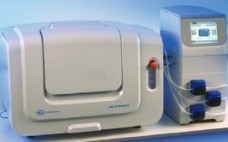Cell-based therapies hold promise for treating many acute and chronic diseases (1). Optimism surrounding that therapeutic potential has driven the initiation of multiple clinical trials in pursuit of such treatments. Procedures for preparing these therapeutic agents begin with selective isolation of cells from desired tissues. That is followed by ex vivo expansion of cells of desired phenotype and functionality. Once expanded to acceptable levels, cells are stored to preserve their viability during transportation to treatment facilities. The final step in…
Upstream Single-Use Technologies
Single-Use, Continuous Processing of Primary Stem Cells
Many potentially therapeutic products involve the culture of stem cells. Their commercial success depends on the development of scalable good manufacturing practice (GMP) technologies that can both robustly and cost-effectively produce very large numbers of cells. Through many improvements and innovations in bioprocessing operations over the years, fed-batch suspension culture has remained the most common mode for large-scale biopharmaceutical manufacturing. However, some recent events suggest that may be changing (1,2). For the culture and expansion of stem cells, large-format adherent…
Cell Therapy Bioprocessing Technologies and Indicators of Technological Convergence
The cell therapy industry is undergoing a natural evolution from scientific curiosity into a commercially and clinically attractive opportunity (1). This evolution is by no means complete, and growing evidence suggests that its progression is driving significant developments in cell therapy bioprocessing — notably, convergence. Table 1: 194; () Progressively, bioprocessing technologies primarily used in production of noncell-based products are being evaluated for cell therapy bioprocessing applications (2). Consequently, this process of convergence is leading to an increasing proportion of…
Cell Therapy Will Transform the Future of Medicine
The third annual IBC Cell Therapy Bioprocessing conference was held in Bethesda, MD, on 21–22 October 2013. It brought pioneers in the development of cell-based therapies together with companies that have enabling technologies, such as bioreactors, cell culture media, and advanced monitoring software. After the conference, I discussed the highlights and key themes coming out of the event with Dr. Phil Vanek, general manager of cell bioprocessing at GE Healthcare Life Sciences in Westborough, MA. Also an instructor for advanced…
Optimizing for the Future
The 2013 biennial meeting of the European Society for Animal Cell Technology (ESACT) was in Lille, France this past June. While there, BPI editorial advisor Miriam Monge (vice president of Biopharm Services Ltd.) interviewed ESACT executive committee member Hitto Kaufmann, PhD (vice president of biopharmaceutical process sciences for Boehringer Ingelheim). They talked about some scientific developments being discussed at this year’s ESACT conference as well as Boehringer Ingelheim’s recent announcement about setting up in China and Kaufmann’s own thoughts on…
Cost-Effectiveness and Robustness Evaluation for Biomanufacturing
As the biotech sector has matured, it has come under increasing economic and regulatory pressures for continuous improvement in both drug development and manufacturing. As a result, assessing the value potential of alternative strategies has become critical to decision-making in areas such as bioprocess and facility design, capacity sourcing, and portfolio selection. Related decisions typically involve large cash expenditures and thus have a direct bearing on the feasibility of business units and whole companies. Figure 1: () Making such decisions…
Development of Protein Capsular Matrix Vaccine Platform Technology
Polysaccharide vaccines account for about 30% of the total >$20-billion/year vaccine market. Despite efficacious vaccines in the field, diseases such as invasive Streptococcus pneumoniae and typhoid fever persist. Development of multivalent polysaccharide conjugate vaccines requires complex chemistries and multiple, expensive good manufacturing practice (GMP) process steps. Matrivax Research and Development Corporation is developing a protein capsular matrix vaccine (PCMV) technology that simplifies synthesis of polysaccharide vaccines with fewer process steps than are required by typical conjugation vaccine processes. Polysaccharide Vaccine…
Inactivated Poliovirus Vaccine Made in Modular Facilities with Single-Use Technology
If current efforts to eradicate polioviruses worldwide are successful, then the oral poliovirus vaccine (OPV) currently used for routine immunization in low- and middle-income countries (LMICs) will be replaced by inactivated poliovirus vaccine (IPV). IPV will become the only option for such countries if they want to continue to vaccinate against polio (1). Because IPV is currently considered to be too expensive for use in LMICs, strategies are being undertaken to make IPV more affordable (2). Some experts estimate that…
Standards for Ancillary Materials Used in Cell- and Tissue-Based Therapies
Cell- and tissue-based therapies are being used increasingly to treat many diseases for which currently no other adequate treatment options are available. These products contain human or animal cells that can replace, regenerate, or augment a recipient’s diseased, dysfunctional, or injured cells, tissues, or organs. Cells or tissues might be unmanipulated, or their biological characteristics can be altered ex vivo before administration of the final product to patients. Examples of cell therapies range from traditional blood transfusions to recent approaches…
Concerns, Collaboration, and Capacity
The BPI Theater is a 50-seat venue that for seven years has been located at the heart of the BioProcess Zone on the exhibition floor of the BIO International Convention. There, BPI provides attendees with four days of live presentations focusing on the latest scientific advances and business trends in biotherapeutic development and manufacturing. On Monday afternoon, 22 April 2013, Patricia Seymour of BioProcess Technology Consultants (BPTC) moderated a roundtable discussion on biosimilar development in the BPI Theater at BIO…

